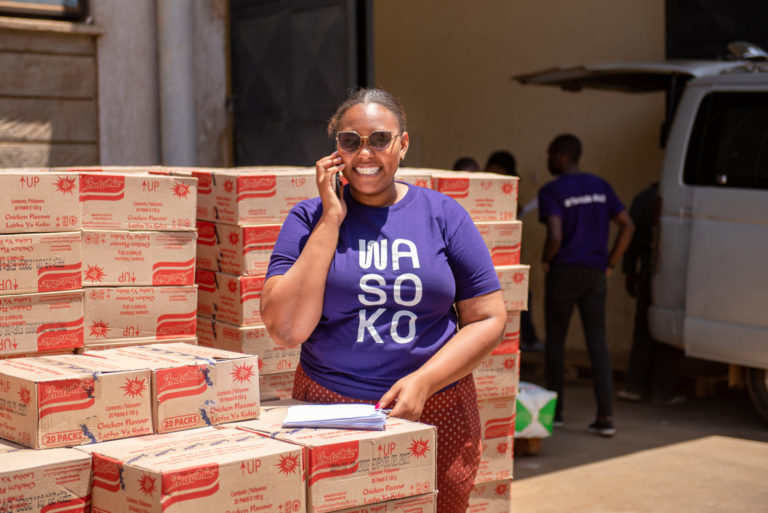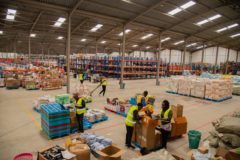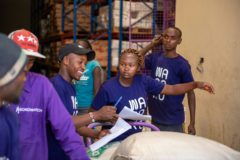Daniel Yu spoke to TechCabal about Wasoko’s latest expansion to Zambia and pivot to a hub and spoke logistics model. The founder also shared his thoughts on Africa’s B2B e-commerce sector, which has been characterised in recent times by layoffs, operations cutbacks, and shutdowns.
Wasoko remains the most funded B2B e-commerce startup in Africa. The company has operated for about seven years and expanded into seven countries across East Africa, francophone Africa, and most recently, Southern Africa. The e-commerce startup shares investors with Africa’s fintech unicorn, Flutterwave, and according to its founder, Daniel Yu, Wasoko is poised to be “a foundational company for the African tech ecosystem.”
The move to Zambia
Last week, TechCabal reported on Wasoko’s expansion to Zambia, a destination the startup had since considered in its expansion pipeline. In 2022, across the media rounds that followed Wasoko’s announcement of a $125 million Series B round, Yu shared that an expansion to Southern Africa was imminent. While some industry watchers expected the startup to set up shop in South Africa, where the retail market grew by 30% last year, Wasoko will be rooting its operations in Zambia’s capital city, Lusaka.
According to Yu, the decision to move to Zambia was hinged on the growing economic projections of the Southern African country. He maintained that the government’s pro-business position and strengthened currency show a drastic move from a failing economy seeking IMF bailouts to a fairly stable one that supports businesses. For context, the Zambian Kwacha was the world’s best performer against the dollar for much of 2022.
“A big tailwind that’s driving the Zambian economy is the huge growth in green technology globally. This has driven a huge demand for copper, which is one of Zambia’s main exports as one of the world’s largest producers. That kind of positioning within the global green economy in addition to this new administration has really cleaned things up and made the country a great investment destination,” Yu told TechCabal.
“Beyond that, Zambia has several large cities that can serve Wasoko. Lusaka, the country’s capital is the largest city in Southern Africa, outside of South Africa. And it’s got a very fast-growing population that is currently underserved by e-commerce and technology. There are also several other cities that inhabit about half a million people in the Copperbelt region of the country. This all adds together to why we think Zambia is one of the highest growth prospects for Wasoko,” he added.
Additionally, Zambia shares a border with Tanzania, Wasoko’s second-largest market. With the Zambian expansion, the startup hopes to build cross-border linkages between its core East African markets and Southern Africa.
Finding operational efficiency
Wasoko operates an asset-heavy model in most of its markets. This usually involves setting up multiple warehousing and logistics operations to serve its customers. However, in Zambia, the startup will be adopting a hub and spoke model which will significantly reduce the need to set up multiple warehouses in the region. The hub and spoke model is a centralised warehousing and shipment system where distribution centres or warehouses are established at a spot in a city from where shipments can be delivered to multiple locations.
For Wasoko, adopting this model will involve using large trucks to move goods from a central warehouse to distances of about 50km (another logistics point), where the goods will be offloaded to smaller vehicles that will complete the last mile fulfilment. Yu described this pivot as an “evolution towards more advanced logistics capabilities,” maintaining that it would enable a deeper coverage of the market.
Yu believes that achieving operational efficiency is a major determining factor for the success or failure of B2B e-commerce startups. “We spend quality time assessing our operations and finetuning them. That’s how we manage to stay profitable on a per-order basis,” he shared.
In a recent article, Rest of World argued that B2B e-commerce startups are scaling back operations and laying off employees as they cope with a drawback in investors’ appetite. This is evidenced by the shutdown of Zumi, layoffs by Marketforce, and the scaleback of Wabi and Alerzo, amongst others. A central argument therein was that asset-heavy B2B e-commerce startups are prone to suffer because the cost of maintaining these assets will always eat into margins. “It’s simply too cash-heavy to scale with such models, given the type of funding African startups receive,” Stephen Deng, general partner at investment firm DFS Lab, told Rest of World.
Yu does not believe this argument. The Wasoko CEO maintains that infrastructure is critical to running a successful B2B startup in Africa. “As a software-only B2B e-commerce company, your margins depend on slices from the suppliers and retailers—both of which already have slim margins. Winning in the market and effectively solving the problem of getting goods to local communities would mean that you have to actually do the operations yourself.”
“And maybe there’s the question of whether these operations are sustainable. For that, I would point you to the hundreds, if not thousands, of traditional asset-heavy distributors, who are already operating in Africa and have been profitable for decades. They just haven’t been doing it with technology so that has limited their scale, but they’ve definitely been profitable. Additionally, controlling the chain makes us cumulatively bigger than any single wholesaler, giving us the advantage of higher buying power which enables us to negotiate for better margins at global markets,” Yu countered.
The future of B2B e-commerce in Africa
Players in Africa’s B2B e-commerce market have continued to increase as they lobby for market share in a market estimated to be worth between $600 billion and $1 trillion. Within the past three years, entrants like Sabi, Alerzo, and Omnibiz have grown from scratch to raise tens of millions of dollars to scale their solutions across several markets. While Daniel Yu agrees that the market has become more competitive, he believes that some newer players are jumping in with copycat business models in order to tap into a perceived “funding spree” in the space.
“B2B e-commerce companies with copycat models are bound to struggle because they’d lack the operational efficiency to grow beyond certain points. It’s relatively easy to start a B2B e-commerce business; scaling is usually where the problem is because that requires a great degree of operational rigour,“ he said.
Yu also believes that in a year, there’ll be fewer players in this space as some businesses would exit the market, ultimately creating more market power for the companies that remain. “B2B e-commerce remains the largest vertical of spending in the African economy. Building solutions that drive efficiency in getting these essential goods to local communities will continue to be a huge growth area for decades. However, optimising the controls and operations of the business remains the major determinant of success,” he maintained.
Daniel Yu’s emphasis on infrastructure and operational rigour challenges the notion that asset-heavy models struggle to scale in the African market, especially as Wasoko continues to make headlines for its expansions rather than for layoffs or operational cutbacks. As the B2B e-commerce sector becomes increasingly competitive, Wasoko’s success and strategic approach position it as a foundational player in Africa’s tech ecosystem, setting a precedent for other innovative startups to efficiently cater to Africa’s expanding retail commerce market.






















